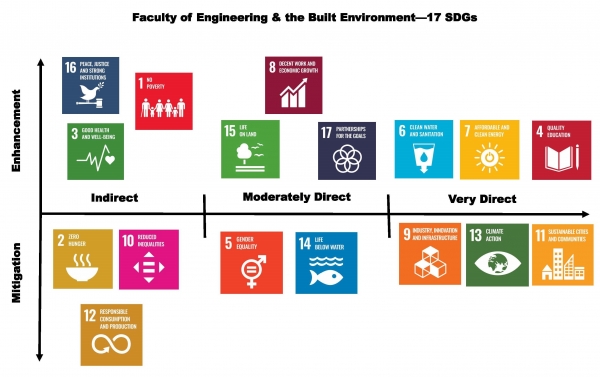
The Faculty of Engineering & the Built Environment plays a critical role in producing graduates who will go out into the world and contribute to achieving the Sustainable Development Goals. Engineers and built environment professionals are involved in the designing and development of infrastructures – roads, railways, bridges, dams, waste management, water supply and sanitation, energy, green buildings, and digital networks.
SDG 2 Zero Hunger
Diseased livestock: infrared system’s early warning
Like humans, animals are threatened by deadly pandemics that spread quickly and, in the case of commercial livestock, decimate herds and flocks. But an inexpensive early warning diagnostic tool developed by the University of Cape Town’s (UCT) Professor Amit Mishra and start-up company 3DIMO holds hope for small- and medium-scale livestock farmers, many of whom are black women.
SDG 3 Good Health and Well Being
COVID-19 multitool opens communal doors, taps
A novel multitool designed by a University of Cape Town (UCT) electrical engineering team will make opening doors and taps much safer for communities who rely on communal facilities but are wary of COVID-19 contaminating public surfaces.
Associate Professor Jenny Broadhurst is the director of the Mine and Heath network which falls under the Minerals to Metals Initiative in the Department of Chemical Engineering and spans several African countries. It brings together researchers, stakeholders and people from a variety of disciplines and professional backgrounds.The network is developing a common understanding around the risks of mine dust and working together towards integrated and inclusive solutions. It serves as a collaborative think-tank to inform research directions both within and across disciplines; government policy and regulations; health monitoring programmes at public clinics; industry best practice; and community healthcare and impact-prevention programmes across Southern Africa – and, as the network expands, the globe
SDG 4 Quality Education
Construction students hungry for 4IR-driven education
In line with the growth of the Fourth Industrial Revolution (4IR), the demand for digital and smart technology-based education related to the built environment is growing, driven by the demand from all industry stakeholders. And students at the University of Cape Town’s (UCT) Department of Construction Economics and Management in the Faculty of Engineering & the Built Environment are hungry for a curriculum driven by the 4IR, said Dr Alireza Moghayedi.
SDG 6 Clean Water and Sanitation
Dr Kirsty Carden from the Future Water Institute will lead the Sustainable Water Management focus area under the Campus Sustainability Project. Transforming UCT into a ‘no-drop wasted’ campus by seeking to embed a more holistic approach to water management in line with Water Sensitive Design (WSD) principles. This will be achieved by assessing alternative water use opportunities on UCT’s main campuses and selecting projects that could be implemented as exemplars/test cases.
SDG 11 Sustainable Cities and Communities
As a Faculty, we are pursuing SDG11 of Sustainable Cities from all different fronts! A huge part of this is analysing and improving the health of our waterways and Future Water UCT are on the pulse of the matter.- all in the pursuit of a water sensitive city.
- Sustainable Innovative Affordable Net-Zero House project aims to examine the sustainability impacts of various innovative building materials and technologies leading to the affordable net-zero house during the life cycle of buildings. The S+CUBE team in the Department of Construction Economics and Management collaborates with local experts across the architectural, engineering, energy and humanities disciplines to design national net-zero sustainable innovative affordable net-zero houses for different climatic zones in South Africa.
- Sustainable Innovative Affordable Housing Initiatives aims to address the lack of sustainable, affordable housing and respond effectively to complex interdisciplinary housing issues in South Africa. S+CUBE is involved with local and international universities, university of technology, funders, institute, government and industry. Interdisciplinary networks and partnerships worldwide have been formed to react to affordable housing challenges in Africa.
SDG 13 Climate Action
Just Transition Transaction case study – towards energy equity
Three University of Cape Town (UCT) climate change experts have carried out a case study to understand what a just transition of South Africa’s energy landscape into a low-carbon environment could look like. This Just Transition Transaction (JTT) aims to simultaneously solve the electricity supply crisis in South Africa while moving the country towards renewable energy, its emissions commitments and job creation in terms of the Paris Agreement.